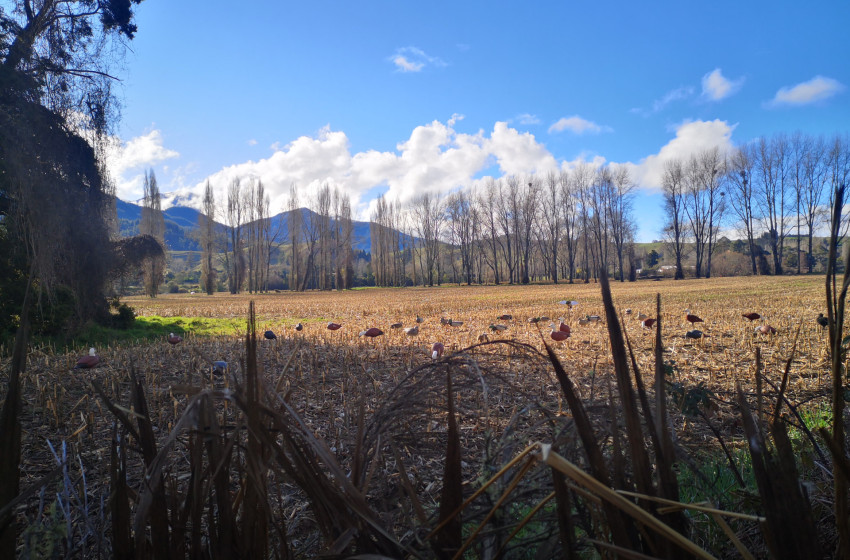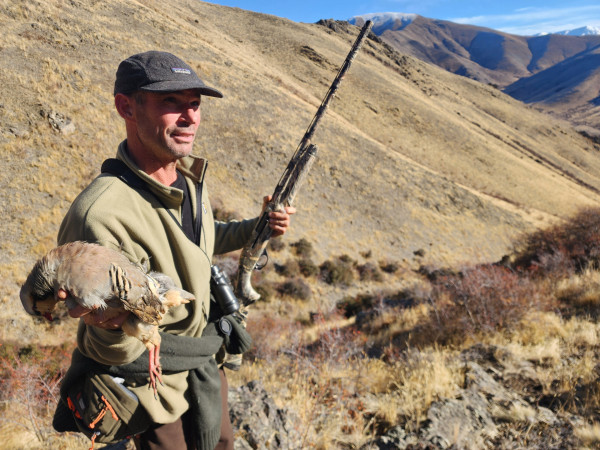Both Barrels July 2024 - Nelson Marlborough
- Nelson/Marlborough
- 23/07/2024

Mallards will go where the food is. Feeding up your hunting spot will increase your bag.
Food – The gift that keeps on giving
It's no secret that gamebird hunting can be a tough gig if you are a Nelson/Marlborough Gamebird hunter. Unlike the East Coast of the South Island where mallards reach veritable plague proportions, and a 50 greylard daily bag limit exists (due primarily to thousands of hectares of cereal cropping), hunters here have it a lot tougher.
This season has demonstrated to us the value of factoring food into your hunting choices in this region – hunters who actively feed their hunting spots from the start of April, even within public estuarine areas others find difficult to access, generally do pretty well on opening weekend and throughout the rest of the season. Hunters fortunate enough to have access to private land where maize stubble exists or similar, also find this can be “the gift that keeps on giving” and achieve the same result without the commitment of having to feed. There are 3 factors stacked against successful greylard hunting in this region:
- A low-moderate overall greylard population due to a lack of extensive grain cropping within much of the region;
- Many “safe havens” where birds are not hunted/disturbed; and
- A general lack of food for mallards which seem to be an obligate agricultural species unlike our native grey duck (which links into the first factor).
All 3 of these factors are addressed once a hunter commits to feeding their hunting spot – even if you only have one pair of ducks using it, they will quickly alert passing ducks and you can literally go from 2 ducks to 60 within a month of feeding depending upon how many birds trade past the site in evening flights and the like. Next season, give a thought as to whether you have access to a pond or waterway within this region that lends itself to feeding during April 2025 – the result may surprise you.
Molesworth Chukar Hunt
In June, a group of hardy hunters from around the country convened in Molesworth to pit their skills against one of the world’s most challenging game birds – chukar. Chukar are found in low-moderate numbers in Molesworth (depending on the block), and can be found at a range of elevation, sometimes spotted low down the valleys and often hundreds of metres higher up in small creek heads.
The weather played ball for the hunt, offering mostly settled conditions, and plenty of miles were walked and metres of elevation gained. Most groups got onto birds, though often interactions weren’t close enough to get a shot away. Those who did manage to get within range were taught a lesson on how hard they are to hit on the wing. These things are seriously quick, going into hyperdrive and using the steep hill decline to their advantage, rapidly putting distance between hunter and safety.
All in all, everyone had a great few days in Molesworth, learning lots about bird distribution which will prove to be valuable for future hunts.

InJohn Gendall with a hard-won Molesworth chukar.
Don't put away your shotgun yet
Don’t pack away your shotgun yet, there are still hunting options over the next month. There is an extended black swan season which starts from 10 August – 25 August. A great place to hunt swans is the Wairau Lagoons, Golden Bay, and they can also be found in smaller numbers around Waimea Estuary.
Quail can be hunted until 25 August. Public land options include the Wairau River (upstream of the Waihopai confluence), and you can also get a permit to hunt Marlborough Conservation land (email here). We have one more OneFortyOne quail weekend (10-11 August) – if you want to gain access to forestry, email here.
The regionally abundant pukeko can be hunted until 27 October, and we encourage hunters to target them due to their high bird numbers.
Swan hunt at Bell Island
In place of the Wakapuaka pukeko drive that was called off due to low numbers of registered hunters and fewer birds, a quick swan/goose hunt was held at Bell Island oxidation plant. Unfortunately, some of the swans got the memo, and the larger mob that had been there previously were not in residence on the day, with only about 15 swans on the main pond. Still, it was a good morning out and around 10 swans and 10 Canada geese were taken as they lifted off the pond and flew past hunters.
Feathers Pataka
We are setting up a formal feather repository (pataka) for weavers to access feathers from. Ultimately we plan to make this available to all 9 Iwi within this region for sourcing feathers for weaving korowai (cloaks).
We are looking for donations of skins from any game bird, especially swan (kakīānau), pukeko, shoveler (kuruwhengi), grey duck (pārera) and paradise ducks (pūtangitangi). If you bag a bird or two and are happy to donate, simply spilt skin down the chest, peel off around the bird up to the wing 'elbow joint, then cut wings so they remain attached to the skin - then freeze them and we can arrange pick-up.